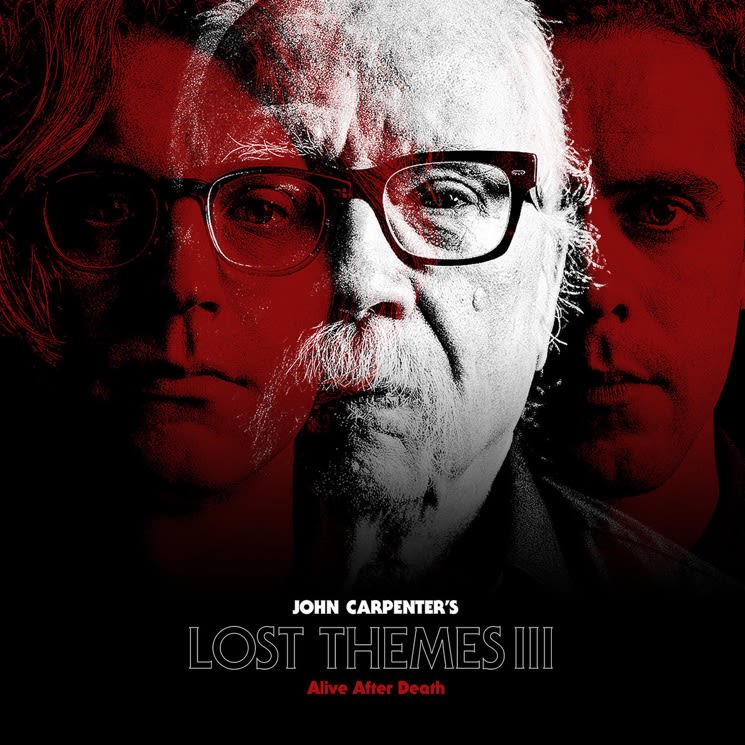Continuing his late-career resurgence as a creative musical force, famed horror director/composer John Carpenter has released his third album of free-standing original music, Lost Themes III: Alive After Death. A collection of original scores for films that don't actually exist, the series offers the fun of imagining all the standard horror imagery from the Carpenter-verse its music could accompany: moonlit suburban streets awash in fog, creepy graveyards, even the signature Albertus typeface Carpenter used for all his credits — a sort of free-associative fugue of '80s horror tropes (developed and codified to no small degree by Carpenter himself of course). While this third entry could be classified as largely more of the same, there's enough freshness here to warrant a closer look, especially if you're already a fan of the project.
The most energizing addition to Carpenter's sound this time around (well-judged krautrock elements dominated previously, and remain here to a somewhat lesser extent) is an appealing synthwave element that creeps into a couple of tracks, especially the excellent "Weeping Ghost." Opening with a steady beat and the album's most memorable synth line, — and clearly meant as something of a calling card in the album's two spot — it immediately brings the album to life, confirming that Carpenter has basically been composing proto-synthwave all along. (His trademark single-note sixteenths — you know them — basically paved the way for the entire genre.) It's something of a pity, then, that beyond one other agreeably pulsing moment, Carpenter largely sticks to his usual bag of tricks here, perhaps missing a certain knock at the door.
It's always worthwhile hearing more of his lush and evocative horror themes, however, and we are once again given helpfully imagistic titles like "Dripping Blood," "Skeleton," and "Cemetery" to help us along. Some stand out more than others. The plucked strings of "Dripping Blood" add nicely to its swooning atmosphere, for instance (a neat mix of the pastoral and sinister that sounds like it belongs in a zombie version of The Princess Bride). The lush organs of "Dead Walk" conjure some kind of undead ball, bejewelled masks resting against rotting flesh. The irony-free confidence that Carpenter brings to sounds that in other contexts might be derided as cliché (cheesy atmospherics and rompler synth presets that have largely gone out of style) remains appealing here — the kind of assurance only a true stylistic progenitor can bring.
Some sections sound a bit under-realized. Carpenter is on record saying that his creative process with collaborators Daniel Davies and son Cody Carpenter often involves starting with a promising theme and adding layers as they proceed, and although hardly an unorthodox approach, its ad hoc nature shows in the material sometimes, with tracks losing direction, or ending abruptly after building towards something that sounded promising. ("Vampire's Touch" is an example of the latter.)
Even so, fans of Carpenter's recent return, and anyone with a slew of slasher movies in their queue, will still find plenty of bone-chilling fun on Lost Themes III: Alive After Death.
(Sacred Bones)The most energizing addition to Carpenter's sound this time around (well-judged krautrock elements dominated previously, and remain here to a somewhat lesser extent) is an appealing synthwave element that creeps into a couple of tracks, especially the excellent "Weeping Ghost." Opening with a steady beat and the album's most memorable synth line, — and clearly meant as something of a calling card in the album's two spot — it immediately brings the album to life, confirming that Carpenter has basically been composing proto-synthwave all along. (His trademark single-note sixteenths — you know them — basically paved the way for the entire genre.) It's something of a pity, then, that beyond one other agreeably pulsing moment, Carpenter largely sticks to his usual bag of tricks here, perhaps missing a certain knock at the door.
It's always worthwhile hearing more of his lush and evocative horror themes, however, and we are once again given helpfully imagistic titles like "Dripping Blood," "Skeleton," and "Cemetery" to help us along. Some stand out more than others. The plucked strings of "Dripping Blood" add nicely to its swooning atmosphere, for instance (a neat mix of the pastoral and sinister that sounds like it belongs in a zombie version of The Princess Bride). The lush organs of "Dead Walk" conjure some kind of undead ball, bejewelled masks resting against rotting flesh. The irony-free confidence that Carpenter brings to sounds that in other contexts might be derided as cliché (cheesy atmospherics and rompler synth presets that have largely gone out of style) remains appealing here — the kind of assurance only a true stylistic progenitor can bring.
Some sections sound a bit under-realized. Carpenter is on record saying that his creative process with collaborators Daniel Davies and son Cody Carpenter often involves starting with a promising theme and adding layers as they proceed, and although hardly an unorthodox approach, its ad hoc nature shows in the material sometimes, with tracks losing direction, or ending abruptly after building towards something that sounded promising. ("Vampire's Touch" is an example of the latter.)
Even so, fans of Carpenter's recent return, and anyone with a slew of slasher movies in their queue, will still find plenty of bone-chilling fun on Lost Themes III: Alive After Death.
